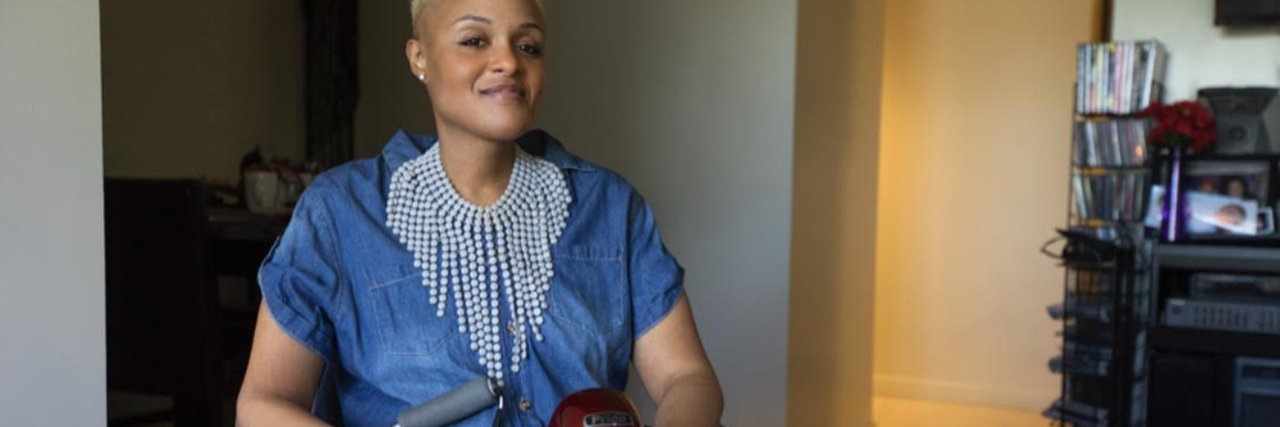My Tips for Traveling With a Disability
Traveling with a disability caused by chronic illness can be challenging, but it’s not impossible. In my experience of traveling with muscular dystrophy (MD), doing the right type of research and proactive planning in advance can help create a comfortable, enjoyable and memorable trip. Some of the simplest outings, such as a date, night on the town or happy hour can pose major problems when it comes to moving about freely with a disability. I’ve had too many experiences not to learn how to make sure the venue and overall trip will be as comfortable as possible.
There are a few suggestions I want to share with those who may be unsure of how to prepare for going out for a night or overnight while living with a disability of any type or cause. Here’s my best advice: Do your research! The first thing I do when going out with friends or heading to another speaking engagement is to ask the following questions to make sure I will be comfortable throughout the night or trip:
- Is the venue wheelchair accessible? You’d be surprised how many restaurants, bars and even hotels will say they are wheelchair accessible but have broken door openers. It’s a bit ridiculous and can be a major pain for someone who struggles with physical energy and strength. Call ahead and have them check if possible.
- Does it have a working elevator? Some venues have upper levels, like balconies and sectioned-off areas of the space that don’t have an elevator. Before you call, Google the venue and see if any pictures pop up. If it looks questionable, ask.
- Is the ground/walking area flat? This is important to know when it comes to planning which equipment you may need to bring or leave home. For me, keeping my balance is critical to preventing falls. Make sure you know exactly what you’re dealing with so you know exactly how to prepare.
- Is there accessible parking near the entrance/exit? Many night clubs or lounges don’t have disability parking, and some stores that have it still require a 40 foot or more walk to make it to the main entrance — which can seem like miles to someone in my shoes. Knowing this information is helpful when figuring out transportation (to Uber or not to Uber).
- Chat with others: This is where support groups really come in handy. When you are thinking about or preparing to travel, reach out to the groups you are a part of to see what others have done to make traveling doable (support groups, social media etc.).
On the flip side, I also want to share some advice with restaurant owners, conference and event organizers on what to anticipate for patrons/attendees with disabilities. This is also a good list of requests to make if you are a speaker or featured guest at an event. How to prepare:
- Have a ramp so the person can get in. Some accommodations are an easy fix. Having a portable ramp will help wheelchair or scooter users navigate easily on and off stage or through one area of a venue to the main exits or additional areas.
- Have seating options that include higher chairs. Sometimes the hardest thing for me to do is sit down and then find the energy to then lift myself back up again. Make this easier by providing seating that is higher (bar height) and more comfortable for those with differing physical needs or limitations.
- Google pictures/call ahead. If you are organizing an event, try to take pictures of entrances/exits, stage areas and any other key venue areas your participant may have to travel through. If you are a traveler, don’t feel like calling ahead to hotels, conference venues or weekend destinations is an inconvenience. This is about your safety and comfort.
- Roll-in shower — not just grab bars (hotels): One of the best experiences I’ve had in a hotel included a roll-in shower. Having this option in addition to the bars on the sides of the shower made one of the most normal routines (taking a shower) safe and comfortable. Ask for this accommodation if you are traveling. If you are the organizer/host, make sure to ask both your guest and the lodging location if a roll-in shower is a part of the disability-friendly rooms.
- Accessible toilets with rails and raised toilet seats. Being able to get on and off the toilet is a simple luxury many folks without a disability take for granted, but having the added touch of a raised toilet seat can make all the difference for someone who struggles with balance, strength and wanting to be as independent as possible. Go the extra mile for yourself or your guest.
A Few More Items to Look for:
- Back cushions — for long periods of time
- Flying — call and ask for a wheelchair ahead of time (skip the line, get there on time, curbside service)
- Apartments — elevator, walk-in shower, total accessibility
- Traveling on a cruise — you can rent scooters and they are generally accessible, from my personal experience on Royal Caribbean Cruise Lines
- Check for medical supply stores — get what you need to travel, or use Amazon.
Best places I’ve been:
- Foxwood Casino and Resort in CT
- Mohegan Sun Casino and Resort in CT
- Royal Caribbean Cruise Lines
Remember: Traveling is possible for many of us living with a disability of any type. You can enjoy a night out with friends. You can go on a getaway overnight or out of town and still have a great time. Don’t let anything or anyone tell you that you can’t enjoy life. Be safe. Be smart. Be prepared. Do your research. Make plans and live your best life.

